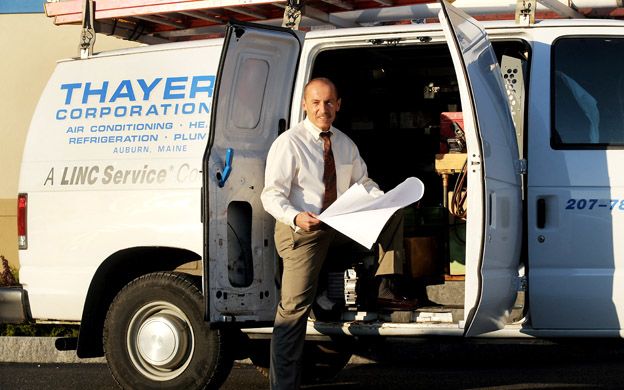Thayer Corp. in Auburn keeps pace in the changing world of mechanical systems and energy efficiency
 photo/amber waterman
Dan Thayer, CEO of Thayer Corp., expects his HVAC and alternative energy system company in Auburn will double sales this year
photo/amber waterman
Dan Thayer, CEO of Thayer Corp., expects his HVAC and alternative energy system company in Auburn will double sales this year
Dan Thayer, CEO and founder of Thayer Corp. in Auburn, is putting the finishing touches on a stack of binders he intends to distribute to a dozen peers — all chief executives at other HVAC companies scattered around the eastern seaboard who are gathering at his Hotel Road facility.
The group, the Mid Atlantic Dealers Association, has been gathering for annual peer reviews of each others' companies for nearly 40 years. Now, it's Thayer Corp.'s turn to undergo intense scrutiny of its operations, markets, revenues and other practices. “I know what they're going to say,” says Thayer. “They're going to tell me to focus more on my core lines.”
But, Thayer concedes, the diversification the company has undergone in the last three years has helped it weather the recession, unlike many other HVAC companies that saw their businesses nosedive along with the construction industry. The company maintains expertise in conventional HVAC mechanical systems, but has additionally developed expertise in biomass boilers, geothermal systems and other alternative fuel systems.
Although it had to close a New Hampshire subsidiary in 2010, Thayer today employs 57 and is on pace to double last year's revenues, landing it in the $10 million to $20 million range in 2011. Better still, more growth is expected in 2012, especially in some recent niche areas the company has developed, many of them connected via an agricultural thread.
Mainebiz sat down with Thayer to talk about the company he founded with his brother 30 years ago. The following is an edited transcript of that conversation.
Mainebiz: You seem to be on a remarkable pace. How did that happen?
Dan Thayer: During the recession, a lot of traditional markets looked like they were drying up. We put out a lot of feelers and looked into a variety of things. One of those was in commercial greenhouses, which on a national level have gone through significant mergers and consolidations. There are a lot of new greenhouse technologies; for example, the kind used in Backyard Farms in Madison. Those heating systems are quite specialized, and an area where we've developed expertise. One of the largest greenhouse vendors invited us to become partners [to design climate-control systems], which we formally started 1 1/2 years ago. We sell the know-how and the equipment; the customer has it locally installed.
What's driving that growth in the greenhouse market?
Several big box retailers have opened garden centers. It used to be that growers were paid for everything that left the greenhouse. Big boxes changed that. Most of the greenhouses now grow seedlings and then ship those to retailers where they're finished. So although the size of the market grew suddenly, the business operation has [also] changed. Those newer greenhouses have more technology in them, and that's an opportunity for us.
And that led to another opportunity…
Which was?
The publisher of FarmTek [an agriculture catalog] gave us a call. They intend to be the leaders in the greenhouse business in five years. They sell [structural] spans for greenhouses and athletic facilities that require specialized lighting, heating and cooling systems, and they were looking for a quality partner.
So we did two proposals for greenhouse and biomass heating systems, which led to a long-term commitment and six pages in their catalogs of our products. They've got 24 million subscribers and a website. We've been taking a lot of calls from that exposure and in the next year, expect to see that become 18% of our business.
What do you do specifically for those greenhouses?
They are tension-fabric structures [tubular frames covered in stretched fabric]. All of them are climate controlled, which is where we come in. Let's say you are a rancher. Rather than import feed for your cattle, you can grow wheat grass [in tension-fabric structures] that can be harvested every 14 days on site. Some farmers in Las Vegas are using this technology to grow shrimp. The technology is changing traditional agriculture practices.
How else are you expanding your markets?
Through our association with Cianbro in Pittsfield, we were contacted by a company in Houston that was having some problems on its oil rigs. We spent a few days around a conference table listening to the problems they were having and at the end of the day, we presented three possible solutions. The executives there told us there was more creativity in those three solutions than the company had seen in three years, and asked us to do the work for them. We've done about a half a dozen projects for them since.
What kind of service did you provide?
The company — Transocean, perhaps you've heard of it [chuckles] — has these mobile oil rigs and $1 billion development drillers. These are highly complicated, massive structures that are affected by waves, currents, wind; computers [steady them.] They were having problems with the engine room overheating, a situation made worse when there was a hard rain. We were there to solve the cooling and ventilation system problems. Now we're talking to a company in Turkey with similar problems.
How else has your business changed?
Our core business has evolved. We do much less work with new construction, but more work in retrofits, renovations and energy efficiency. I'd say about 50% of our projects are implemented for energy efficiency; we've been doing a lot of renewable energy work.
Did stimulus funds increase that work?
I know this will seem odd, but I think what it did most was distort the market. I'll explain what I mean. We had a lot of commercial customers interested in switching from fossil fuels to renewable fuels. We had something like 20 projects in the pipeline and then suddenly everything was put on hold. They wanted to apply for [stimulus-backed] grants to finance these transitions and if they didn't get them in the first round, they decided to wait for the next cycle. Many were waiting for free money, not pursuing a conversion in alignment with their long-term plans. I think we would have done double the projects without the stimulus incentives. Since the stimulus money went away, we've been seeing a steady increase in energy-efficiency activity. Not what you'd expect, right?
Do you have any thoughts on financing or providing incentives for more businesses to go toward renewables?
I think we need a systems benefit charge on fossil fuels. Efficiency Maine is funded through a systems benefit charge, that small tariff on each kilowatt of electrical energy sold, and through RGGI, the Regional Greenhouse Gas Initiative. But 85% of the state is heated with fossil fuel, so why is electricity footing the bill [for energy efficiency] and fossil fuels aren't? I think we should consider a systems benefit charge on all sources of energy.
In a broader sense, think about the economics of our energy mix. For every $1 spent on energy, nearly 85 cents leaves the state of Maine and most of the U.S. But for every $1 spent on wood chips or pellets, 85 cents stays in Maine, and there's a significant multiplier effect from that. What I think is the most exciting change is the notion of fuel crops planted to become pellets or baled [as fuel for biomass boilers]. Northern Maine is grossly underinvesting in fuel crops, where they can do quite well. Plants such as switch grass and miscanthus giganteus [a type of hybrid grass] are optimal. They generally don't require nitrogen or fertilizer, so there are no minerals to burn — it's a clean fuel. And here's the punch line: As pressure on woody biomass mounts and demand increases, the cost of developing fuel crops will become more attractive.
We've been talking about the connections between your business and opportunities in agriculture. Didn't you start the company in a chicken coop? Do you feel you're going back to your roots?
[Laughs.] Well, rent was cheap in that chicken coop. In that sense, we're still keeping an eye on our costs of doing business … I often get the question, ‘Why do this in Maine?' We pay higher taxes, higher benefits charges … we have to be smarter as a result. It's the only place [for my company] because of the people — they are extremely talented and committed. You go outside this geographic area and you just don't see that.










Comments